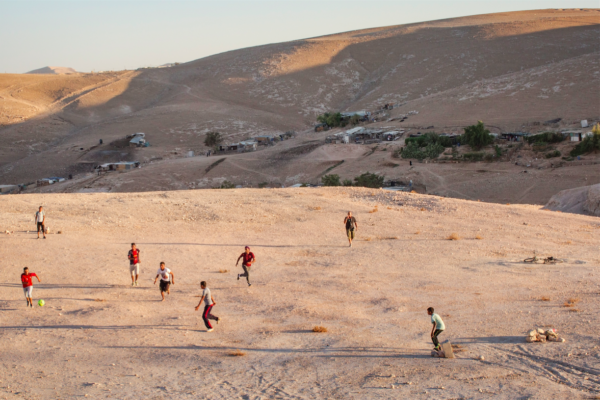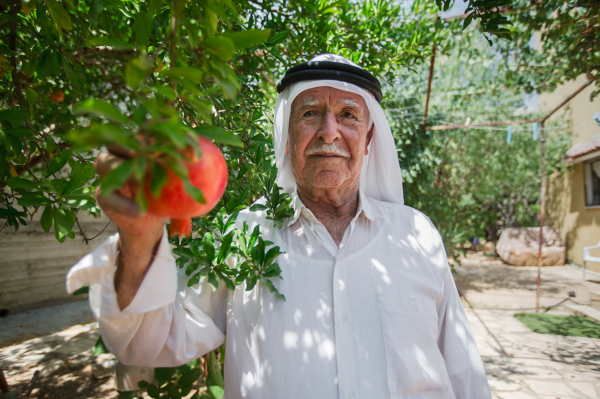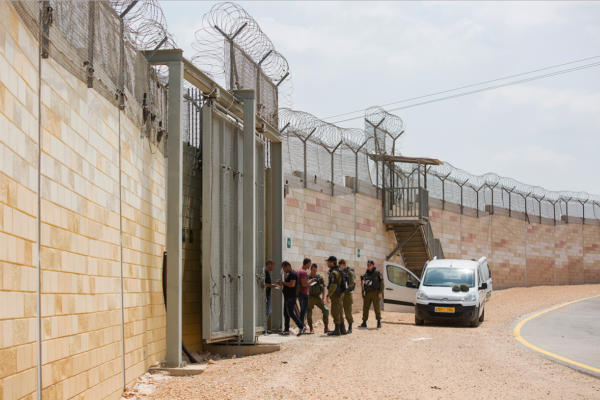This coming weekend the FIFA council is set to make a decision regarding the Palestinian FA’s complaint on the Israeli settlement teams. This is our report from the West Bank.
By Håvard Melnæs
Translated by Lars Johnsen
Interpreter Hussein Abu Dweikh
Photos Faiz Abu Rmeleh
“It’s a bit chaotic here today because the president of Israel, Reuven Rivlin, is coming to visit in a few hours. Everybody is running around like rabbits. Me too.”
We’re on the football pitch in Ariel with Shay Bernthal, the head of Ironi Ariel Football Club. The first settlers arrived here in 1978, making Ariel among the oldest Israeli settlements on the West Bank. The West Bank is internationally recognised as part of Palestine, but since the “Six-Day War” in 1967 it has been occupied by Israel. For 50 years the 2,5 million inhabitants of the West Bank have lived under occupied rule. The UN Security Council have repeatedly stated that the settlements are illegal. A fact that has not slowed the Israeli authorities’ expansion policies. More than 550 000 Israelis live on illegal settlements, among them many members of the national assembly Knesset and cabinet ministers. The wall dividing the settlements from Palestinian towns and villages stretches 810 kilometres. When construction work began during the 2000s, the aim was to make sure that as many Israelis as possible lived inside and as many Palestinians as possible would be kept outside the wall. According to the UN, the wall is the main reason for the poverty the Palestinian people suffers.
In 2011, the Palestinian FA (PFA) wrote an official complaint to FIFA demanding the Israeli FA-affiliated clubs cease their activity on occupied Palestinian land. One of the clubs included in the complaint is in Ariel. For years FIFA has avoided taking a position on the matter. But during the FIFA congress in Bahrain in May of this year, FIFA president Gianni Infantino promised a decision would be reached by the FIFA council the last weekend in October. As the number of settlements rises, the amount of Israeli football clubs playing on occupied territory grows.
According to FIFA regulations, a national federation cannot organise activity on the jurisdiction belonging to another federation. The Swedish FA, for instance, cannot set up clubs in Norway and admit the clubs into the Swedish football league pyramid.
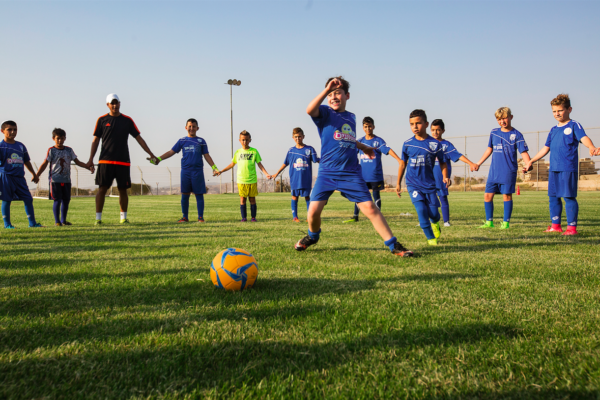
“Football is a leisure activity”
“Football has been played here for 30 years. Children and youths from Ariel and the surrounding areas come here to play several times a week. There is no better activity for young people,” Bernthal says with a smile.
He’s a jovial character who works as a real estate adviser, but says he spends more time on football than on work.
“I admit it. I’m crazy about football.”
Bernthal smiles again.
The club fields five teams organised under the auspices of the IFA. Four boys’ teams and the men’s side.
“We have about 250 active players. 40 of them are adults. Football is played here almost daily, but not on Fridays and Saturdays. We are religious people who respect the Sabbath.
“Our ambitions are big and we have two clear goals: Firstly, we want football to be a positive leisure activity for children. Secondly, we want to climb the league pyramid. In time we want to play against the biggest clubs in Israel. I have strong beliefs that we will do that. One of our youth teams played Hapoel Be’er Sheva last year. We lost the match, but it was even and we did very well. It shows that there is not a lack of talent here in Ariel,” he says.
Before this season, which runs from October to May, the aim is promotion. Shay Bernthal has signed players whom he believes will lift the level of the team. It currently plays in the 5th Division, Israeli football’s bottom tier.
“We’ve come close the last three years. This year we will finally make it. Some very good players have arrived at the club. They don’t get a salary, but we help them out with driving expenses and a few other things,” Shay says and smiles again.
He must leave now. He needs to sort out a few things before the presidential visit.
“Come back tomorrow. The place will be buzzing with activity. You can talk to everyone. The players, the kids, their parents. Everybody. But you cannot ask about politics. Football is a leisure activity,” Bernthal says. For the first time during our conversation, the smile goes away.
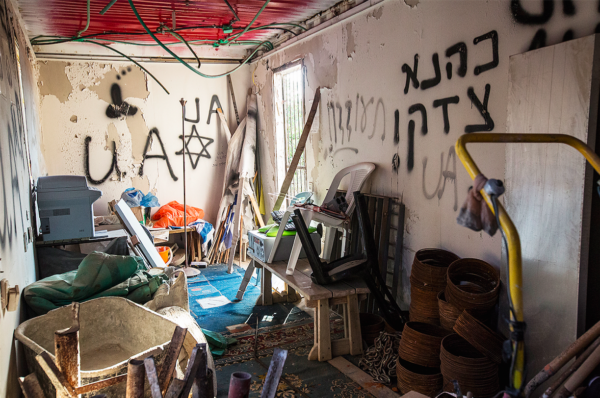
Trust in God and FIFA
The following evening 40-50 boys aged 8 to 15 are warming up on the pitch in Ariel. The coaches are giving instructions. Shay Bernthal is present. His smile too.
“The first training session of the season for the first team takes place later tonight. Before training I will address the players. We all have to aim for the same thing: promotion. I have big expectations,” he says.
The sun is scorching. We take refuge in the shade of the substitute’s bench.
“Football is by far the most popular sport here in Ariel. We are the biggest sporting club in the town. The club’s budget is 700 000 shekels (approximately 200 000 euro). The town sponsors us with 250 000 shekels. The rest comes from training fees, other sponsors and so on. I am really proud of what we have accomplished here. We have several Israeli Arabs in the team, even a Druze and a black man.”
Ariel just celebrated reaching 20 000 inhabitants, he tells us.
“We have been waiting a long time for this day,” Shay Bernthal says and smiles.
We ask him about the complaint from the Palestinian FA and the possible consequences it will have on Ironi Ariel FC if FIFA were to rule in favour of the PFA.
“This is a desperate measure from the PFA, to mix football and politics. They use football for political gain. They use innocent children. Why do they want our children to suffer, children who only want to have fun in their spare time? If they, in their opinion, have a proper case, they should present it to the UN. We all know of [Palestinian FA president] Jibril Rajoub. He’s a politician, not a football man. He’s not interested in sport. He’s trying to play the hero for his population,” Bernthal says.
What are the consequences if FIFA rules in favour of the PFA?
“It won’t happen.”
Internationally, the settlements are seen as controversial?
“That’s because they do not know the truth. The fact is that 80 per cent of the club are children. The Palestinians are using football to reach their political aim, which is to kick us out.”
Shay Bernthal says his whole family, his wife and three kids, share his love for the game.
“To us, football is life. I watch almost all of Ariel’s matches, including youth matches. I watch teams from other areas too. I watch Barcelona, Real Madrid and all the big tournaments.”
The first team players have started to arrive. Shay Bernthal gets up. He’s about to give his pep talk to the players before the season kicks off. With quick steps he walks towards the dressing room. He turns around.
“If you meet Jibril Rajoub, tell him that he uses football for political gains.”
The smile and Shay Bernthal disappear.
Ariel’s first team captain is Eliko Benayoun. He has played several season in the two top divisions in Israel. If the name rings a bell, you’re not mistaken. His uncle’s name is Yossi, arguably Israel’s best ever player. Eliko says he was born in Ariel 30 years ago and has lived here for most of his life. Except the year he played professionally in Cyprus.
“I am proud to be captain of a team of Christians, Muslims [Israeli Arabs, that is], Druze and blacks. Football does not divide people, it uniteds them,” Benayoun says.
Adjacent to the dressing room, two rusty containers have been placed. They have probably been there since 1978 when the first settlers arrived. The inside walls are grafitti-sprayed with anti-Arab slogans.
«Death to Arabs» is most prominent.
The man with the tooth
Some of those owning land in Ariel live in Salfit, the neighbouring Palestinian town. At the road junction that leads to Salfit, the warning sign is impossible to miss.
This road leads to a Palestinian village. Driving on is dangerous for Israeli citizens.
The road sign is not the work of Palestinians, but of the Israeli army.
We’re in the home of Ahmed al Dimes Shahin. While his wife serves us coffee and biscuits, he tells stories of his youth as an active Communist. The 83 year-old laughs a lot. Whenever he laughs, we get to see he has only one tooth.
The conversation turns to Ariel.
Through several generations and hundreds of years, Ahmed al Dimes Shahin’s family has owned land in what today is known as the illegal settlement of Ariel. He asks his wife to find the maps and documents that prove it. He shows us which areas in Ariel he owns.
“Houses have been built there,” our interpreter Hussein tells him.
“Really? I didn’t know that. I haven’t been there since 1973.”
At first he’s silent when we ask him to tell his story. Then he says:
“In the beginning of the 1970s I got a visit from the head of the armed forces of the area. He said the Israeli army wanted to rent my land. He offered me money. I said no. I was a farmer and told him I did not want to rent out my land,” Shahin says.
Two, three months later the first containers and caravans with Israeli settlers arrived. They came without a permit, but with military protection.
The Palestinian name for Ariel is Wad Haja. The Palestinians lived in Salfit, but used the land for livestock and to farm vegetables, grain and fruit.
“When the first settlers arrived, I went I out there. I tried to visit the land I own, but the soldiers stopped me. Settlers with guns stood behind the soldiers. I was told to stay away as this now was military territory. I was ordered not to come back. If I had any trouble with the decision, I was told to contact the army’s headquarters for the West Bank in Nablus.
“I went there, but once again I was told the land now was in the possession of the army. In the meantime, the settlers, with help from the soldiers, had started building fences. I couldn’t access my land”, the 83 year-old Palestinian says.
He asks for a break. He doesn’t like to speak about this, he says. It evokes too many bad memories.
“I have never been to Ariel. I am not welcome there. Even though I own land there,” Ahmed al Dimes Shahin says.
What’s your view on the settlers?
“The colonists are our enemies. They occupy our lands, our homes. They ruin our lives. I am fifth, sixth or seventh generation farmer. The soil is part of me. I start crying every time I think of what has been stolen from me. The land is my blood, my life. It’s as if a part of me is gone.”
40 acres of land in Ariel are his. Half of it consists of housing. The other half has become desert.
Ahmed al Dimes Shahin gets up. Two men have come to visit. One of them is named Khaled Ameen Maali.
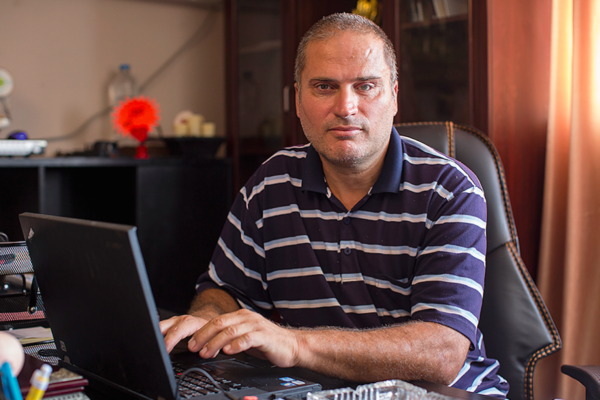
Those who come knocking at night
He has spent most of his adult life researching the Israeli settlements. Most of the information he finds, the settlers have published themselves. Often on their own websites. Khaled Ameen Maali translates them from Hebrew to Arabic and spreads the information, usually through Facebook. Over the years he has become a kind of expert on settlements. We ask about life in Salfit. He says it’s good and difficult at the same time. We want him to explain.
“Where should I start?,” he asks.
“We have virtually no freedom of movement. For example, I cannot travel to East Jerusalem. Only Palestinian men over the age of 65 can travel there. Travelling on the West Bank is a constant problem, regardless of where I’m going. We’re being harassed by the police and soldiers. You go in and out of checkpoints, where soldiers do whatever they can to make it as miserable as possible for us. They’re ruining our lives on a daily basis.
“In Salfit, like most of the Palestinian villages on the West Bank, night raids are frequent. Soldiers come at night. It happens every year, every month, every week. Some weeks they come several nights in a row. Sometimes they come to arrest someone. Other times they come to deliver a message or simply to bother us. To demonstrate power and create fear. Many have trouble sleeping. Is it our turn to be granted a ‘visit’ tonight?”
On 8 November last year the soldiers knocked on the door of Khaled Maali and his family.
“It was two o’clock in the morning when my wife, children and I were awoken by loud banging on the door,” he tells us.
When he opened the door, he saw between eight and ten military jeeps. Each carrying four or five heavily armed soldiers. Five soldiers pushed Khaleed aside and made their way into the house. They confiscated his phone and computer. One of his hard drives contained information from almost 20 years of research.
“The soldiers had camouflage-painted their faces. My four children were scared to death. My eight year-old daughter starts to cry every time she sees soldiers. She thinks they’ve come to take her daddy away. That is the result of the occupation.”
Khaled Ameen Maali was arrested, jailed and handed a fine of 2000 dollars.
On the fourth day of his imprisonment he was taken to a judge in Jerusalem. The army did not have grounds to make the arrest, the judge ruled.
But he needed to pay the fine before he could be released. His wife had to borrow money from an acquaintance in Salfit. After eight days he was a free man.
He didn’t get back the computer containing 20 years of research material.
“They told me to stop publishing information about the colonists. It didn’t help that I explained to them that the information came from the settlements’ own homepages. ‘If you behave in the future, do not post information about the settlements and are a good boy, one day you will get your computer back’, was their answer.”
Khaled Ameen Maali is still waiting. He knows he’s waiting in vain.
Suddenly he asks a question.
“Do you own a home in Norway?”
Yes.
“What would you have done if I had come to take over your house? Would you be OK with it? Would you throw stones at me? Shoot me? All we demand is justice. We will never give up. Not before Israel tears down the settlements, every single one of them. Palestinians have not come here to kill. We have always been here. It’s the Israelis, who have arrived from all over the world, who come here to kill us. We want peace, Israel wants conflict.
“We’re tired of suffering. We hate war. We’re tired of being second-class citizens in the so called ‘democratic’’ State of Israel. Which other democracy sends dozens of soldiers to your house to arrest people in the middle of the night? Is it because I have done something illegal? No. All I have done is to collect information – information the settlers themselves have made public. Is this a crime in a democracy?
Am I the criminal here. No, it’s the Israelis who have stolen my computer, my phone and my money. And this is nothing new. Israeli soldiers have been doing this all my life,” the 39 year-old says.
Khaled Ameen Maali was a teenager when he first witnessed a night raid. The Israelis knocked on his mother’s door.
“My mother refused to let the soldiers in. She wanted to protect us children. Using the gunstock, one soldier hit her hard in the stomach. She passed out. Eventually we woke up the neighbours, who took her to hospital. The doctor said her kidneys had been severely damaged. She never recovered. Her health deteriorated quickly and she died within a year from the injuries.”
He changes the subject.
“Did you know the Israelis steal our water and send their sewage in return?”
We thank our host Ahmed al Dimes Shahin and travel on with Khaled Ameen Maali as guide. Ten minutes later we are down in the valley. Being the West Bank, it is surprisingly lush and humid. We spot a few rusty containers some distance away. They serve as homes for Bedouin families.
“Come here!”
Khaled Ameen Maali holds his nose. A small river runs through the valley. The “water” is brown. It stinks. It is sewage.
“Underneath most of the West Bank, you’ll find large water reservoirs. The Israelis steal our water. The consequences are that we, who own the land, must ration our water. Especially during the summer, in the hottest periods, we suffer from water shortages. Sometimes we don’t have access to water at all. They steal our water, and what do they send back to us? Sewage.
“This is my life’s calling: To inform the people. And I will never quit.”
The wall
We have driven several kilometres along the omnipresent wall that separates the Jewish settlements and Palestinian villages on the West Bank. We are trying to find the settlement Oranit, where the football club Hapoel Oranit is located. Hapoel Oranit is another of the clubs included in the Palestinian FA’s complaint to FIFA. The much-hated and equally much-loved wall divides three close towns. Oranit was established in 1983. Around 8000 people live there. The settlement is infamous for being home to some of the most extreme and most fanatic Jewish colonists.
A few hundred metres west of the checkpoint that marks the entrance to Oranit, lies Kafr Qasim. It’s a town with an Israeli Arab majority. A few hundred metres to the east, we find Azun Atma – the Palestinian village behind the wall. We drive to the entrance and see two young Palestinian men being stopped and held by the Israeli soldiers. The two youths are probably on Israeli occupied territory without the necessary permits. The soldiers take them away.
We walk over to the wall. It’s six metres in height. Massive concrete, barbed wire and surveillance cameras. The construction dominates the landscape.
Only Palestinians who work in Oranit or Kafr Qasm who possess the right permits are allowed through. The brothers Ahmad, 14, Mustafa, 13, and Yosef, 10, walk towards the gate. According to a sign, the gates are open between 07:00 and 07:30, from 12:30 to 13.00 and from 18:00 to 18:30. If you live in Azun Atma, you have to make sure you show up at these times. If you’re running late, you will not be let in or out. The brothers work on land owned by their family between Oranit and Kfar Qasm and have finished work for the day. They’re returning home. It is 12:30.
More than ten minutes later a jeep with four young and heavily armed Israeli soldiers arrives. We’re told to back away when they’re about to open the gate.
“It’s often trouble here,” a soldier says.
It’s 12:49 and the brothers can walk through.
A woman’s sorrow
Close to the Oranit checkpoint there’s a field where vegetables grow. Insherah Yahea watches over her crops. She grows aubergines and cherry tomatoes. Until the war in 1967 this area was part of Jordan. 30 acres in Oranit belongs to 61 year-old Insherah Yahea, her brother and their families.
“We’ve used this land to grow vegetables and grain for generations. I remember working our fields in Oranit as a girl. Now I haven’t been there since 1983, when the settlers arrived.”
“For years we fought for access to our lands. We’ve had lawyers working for us, we’ve written to all the responsible authorities. The official explanation is that the area has been confiscated by the Israeli army – for military reasons. During the 1980s Oranit grew into the town it is today”, Insherah Yahea says.
In 2007, she was told her land, where once all sorts of vegetables had grown, had been destroyed by the town administration in Oranit. They said there were snakes there and the snakes were a threat to the children.
When you worked there in your youth, were snakes a problem?
“You have to remember that this isn’t the reason. It’s just something they say. I never saw a snake when I worked those fields.
“When I first heard, I started crying. The tears just wouldn’t stop.I couldn’t believe it. Who wants to destroy perfectly farmable land, cultivated through generations? I almost had a heart attack. I was that upset.”
A car approaches where we’re sitting. Three men step out of the car. They talk with Insherah Yahea for a few minutes. She remains silent throughout. She strolls into the caravan and disappears out of our sight. One of the men, who presents himself as her nephew, comes over to us to explain.
“She’s afraid. She’s worried there will be consequences for talking to you.”
What is she afraid of?
“The Israelis and what they might do.”
“They are our enemies”
The soldier guarding the checkpoint entrance to Oranit lets us through after checking our identification papers. Just like everywhere else in the West Bank, the difference between the illegal Jewish settlements and the Palestinian villages is huge. In Oranit, the inhabitants can enjoy indoor and outdoor swimming pools, a basketball court, tennis courts, a spa and football pitch. The football pitch is located on what used to be farmed land that still belongs to Palestinians, according to Insherah Yahea.
We have tried to get hold of the chairman of the football club – to no avail. Instead we decide to visit the town’s administration to hear if they might help us. Inside the administration’s building, we explain the purpose of our visit to a woman.
“Just a moment. I will find the number for you”, she says.
She disappears, but returns after a short while with a note in her hand. As she’s about to hand it to us, a man with a loud voice asks:
“Who are you and what are you doing here?”
A tall and well-built man approaches me and my photographer. I explain who we are and what we are doing here.
He turns to the woman and says in Hebrew:
“You shall not help them. They are our enemies.”
I ask the man who he is and what the problem might be.
“Who I am? You ask me who I am? You come to my home and ask me who I am?”
He’s angry. From out of nowhere another man appears. In his belt he has a revolver. The armed man looks at us with a grin.
The tall man shouts to the other people working in the town’s administration.
“No-one shall talk to these people. They are against us, they are our enemies,” he repeats in Hebrew.
The situation has turned tense. We decide to leave. Outside the building we do an internet search. A man named Shlomi Langer is the mayor of Oranit. We’re about to call him when our next search reveals that Shlomi Langer is identical to the man who minutes earlier described us as “enemies”. Later we find out the very same Shlomi Langer for 30 years worked for Shin Bet, the brutal Israeli security service who has tortured and murdered Palestinians for decades. In Israel, they say, Shin Bet is above the law.
In the desert
It’s a sweltering hot day in the Judea Desert. As we park along the motorway, the thermometer shows 44 degrees. We’re close to Ma’ale Adumim, one of the biggest settlements on the West Bank. We’re about to visit the Bedouin community in the village Khan al-Amar. A few weeks previously, Israeli prime minister Benjamin Netanyahu visited the area. He assured the Jewish settlers that the Bedouins would be chased away. The goal is, Netanyahu said, to incorporate Ma’ale Adumim and the other settlements nearby into the new Greater Jerusalem.
It means that the Bedouins here is forced to find a different place to live. Many Bedouin families have already moved (been forced to move, that is) to other areas. 20 years ago the village held 1600 goats and 28 camels. Today the herd consist of 250 goats and no camels.
To meet the Bedouins, we have to cross the heavily trafficked motorway. The small village consists of 40-50 caravans and containers. Sand and stone define the landscape. About 500 Bedouins live here, young and old, in severe poverty and under constant surveillance.
Israel denies the Bedouins electricity and water. They want them gone and are prepared to use any means.
The Bedouin leader Eid Abu Khamis welcomes us with coffee in his tent. The area was under Jordanian jurisdiction until 1967, he tells us. The Bedouins lived in freedom and off their livestock. A few years after the war, the Israeli army arrived and said this was now military territory. They were told to leave. The Bedouins refuse to do so. But at a high cost.
“The soldiers have become more aggressive in recent years. They harass us night after night. They shoot towards our tents and caravans while we and our children are asleep. They even fire using tanks. We confront them: Why are you shooting at us? There are children here!
“They answered that they were doing target practice,” Abu Khamis says.
The Bedouin community spread into smaller groups through the Jordan Valley numbers 7000 people. They have lived here for generations. 52 year-old Eid Abu Khamis was born here in Khan al-Amar. In 1977 the army decided they would pass on the land to Jewish settlers. One night, not long after, the first ones arrived.
Built with car tyres
Back in 1991 the Bedouins applied to the Israelis to build a school. The application was denied. Then they asked if Israeli authorities could provide them with a bus to take the children to the nearest Palestinian school. Another rejection.
Because Israel sees the Bedouins as living on military land, the law does not allow them to build anything that can resemble a proper building. No concrete, no walls. With economic contributions from various sources, they started building a school in 2009. After 30 days, the school, which today has 170 pupils, opened.
“It’s built using car tyres, mud and clay,” Abu Khamis says with a smile. “The law says nothing about buildings made from car tyres.“
The settlers of Ma’ale Adumim were furious when they discovered the school. Soldiers arrived and threatened to tear it down. But because international organisations, like the EU, had contributed economically, the Israeli authorities had second thoughts about destroying it. It could mean unwanted international attention.
Israelis of the nearby settlements have tried to take matters into their own hands. Several times they have snuck into the camp at night and tried to set fire to the school. They want the Bedouins gone, by any means necessary. Almost every night since 2009, parents have taken turns guarding the school at night.
“In practice, we live under apartheid. If anyone falls ill, the ambulances needs special permissions to come here. To get the permits they need can take days, even weeks. Often it’s too late,” Abu Khamis says.
Several organisations want to help the Bedouins.
“This spring an Italian organisation sent us three caravans. The following night they were vandalised beyond recognition by the settlers. A Dutch organisation provided the school with solar panels. The day after they went up, the soldiers came and took them down.”
How can it be that they steal things straight after you’ve received them?
“They monitor us,” Abu Khamis says and points to the sky.
“Using drones.”
What does the future hold for you?
“They take away anything we have. We have nothing to live from. Our survival depends on help from the outside.”
A shopping centre and a disappearing ball
The most popular after-school in Khan al-Amar is football. On the flattest plateau in the valley, roughly one kilometre from the camp, the children play football. An American woman who visited the Bedouins in 2015 have since provided them with kits, balls and goals. The goals don’t last long.
“As soon as new goals are in place, the settlers come with machine guns and pistols. Usually, they fire a few shots into the air, to scare the players away. They cut the nets, and kick the posts until they break. They play loud music, drink alcohol, smoke hashish and party through the night. It has happened so many times we’ve lost count,” Abu Khamis says.
50 boys and men ranging from 8 to 25 in age play football. Once a week they get to train on an artificial grass pitch in Jericho, 20 kilometres away.
Josimar will watch them train later. But first we visit Ma’ale Adumim.
As usual, we must show our identification papers to the military personnel at the checkpoint before we’re let in. According to the last count, there are over 300 checkpoints with armed guards on the West Bank.
Ma’ale Adumim is a Jewish settlement with almost 40 000 inhabitants. At the same time as the number of settlers rose dramatically during the 1980s, 1000 members of the Jahalin tribe of Bedouins were forced out.
This is now an “all mod cons” community. A huge shopping centre is the heart of the settlement, with cafés, shops and fast food outlets.
Eyebrows were raised when McDonald’s in 2013 rejected the opportunity to open restaurants on occupied territory. The settlements then accused McDonald’s of anti-Israeli propaganda. You won’t get a Big Mac here in Ma’ale Adumim, but Pizza Hut and other, local fast food chains have opened restaurants in the settlement. The sporting goods store sell brands like Nike and Adidas.
The town’s administration is located in the adjacent building. Several attempts to get hold of the chairman of the local football club, Beitar Ma’ale Adumim, have not yielded any results. Still, we’re hoping for a warmer welcome than we received in Oranit.
But we don’t even get a foot inside the door. A firm security guard tells us we won’t get in without an appointment. We try to explain the reason for why we’re here. Again, in vain.
We drive back to the Bedouins of Khan al-Amar.
We follow eight boys onto the plateau, surrounded by deep valleys, that function as playing surface. Some wear football boots, others wear trainers, one is barefoot.
For goalposts they use rocks. The boys play four a side. After five minutes they take an unwanted break: One of the boys shoots towards goal. It’s not hard, but the uneven playing surface makes the ball gain speed. It doesn’t rest until it finds the bottom of the valley, several hundred metres away. The barefoot boy runs to fetch the ball.
He returns after ten minutes with the ball under his arm. The match can continue. The boys are enjoying themselves, but controlling the ball on sand, gravel and rocks is not easy. When the training session ends, I ask them who the best player in the world is.
“Messi!,” some of them shouts.
“Cristiano,” respond a few of the others.
“I am,” Ahmed, the barefoot boy, says and laughs.
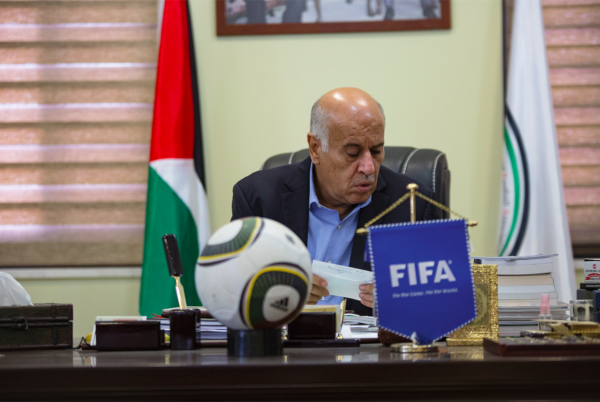
Trust in the FIFA family
The Palestinian national men’s team is on its way to Bhutan to play an Asian Cup qualifier while we’re headed towards the city Al-Ram where the PFA’s offices are located besides the national team’s home ground, the Faisal Al-Husseini International Stadium. We have an appointment with PFA president Jibril Rajoub. He has lived an illustrious life. Before he became PFA president, he was, among other things, head of Yassir Arafat’s security forces on the West Bank. He was only 15 the first time he was arrested by Shin Bet.
We’re approaching Al-Ram, driving parallel to the wall dividing Palestinians and Israelis. On the other side of the six-metre high wall with barbed wire, sits the home of the Palestinian FA. Everyone travelling to Al-Ram must go through the checkpoint Kalandia, one of the biggest and most-feared on the West Bank. We are early. The driver knows from experience that you could be here for hours. We’re lucky, the traffic is less heavy this morning than usual.
Photographs adorn the walls of the PFA offices. Several of them are of Jibril Rajoub with Sepp Blatter, and Rajoub with Michel Platini.
His office is big, the sofa almost swallows you.
“I hope the FIFA council will reach the right conclusion. Organising football outside one’s own jurisdiction without permission is a breach of FIFA regulations. What do we need regulations for, if they’re not adhered to? And the colonist clubs are in violation of UN’s human rights code. FIFA has asked the UN to verify, and the UN has confirmed it, that these clubs play on Palestinian territory,” Rajoub says.
Do you believe they will reach a judgment after stalling for years?
“The repeated postponements is not fair play. It has been tough for us, but it’s better to have a right decision late than no decision at all. The Israelis should of course be permitted to play as much football as they want, but they have to do so within their borders. But as we’ve come to know, the Israelis continue being the playground bully, and insist on organising football also outside their borders.”
FIFA is renowned for not following their own regulations. What makes you so sure they will do that in this instance?
“I can’t say FIFA doesn’t play by their own rules. I have trust in the FIFA family and I trust the rules will be upheld. I know the majority of the member nations supports us.”
The PFA is a member of the Asian Football Confederation (AFC). Israel is a member of UEFA. How does the AFC view the Palestinian complaint?
“It’s just about consensus for our cause, something the last AFC congress showed.
“Listen: Israel uses any means. Prior to the FIFA congress in Bahrain in May, Netanyahu called Infantino. During the 40 minute-long conversation he is believed to have persuaded Infantino to postpone the decision. The Israelis fear that a negative FIFA decision will have political repercussions. The diplomatic corps was sent to work. The ambassadors were told to contact the presidents of the football associations in the country they were stationed to tell the Israeli side of the story,” Rajoub claims.
“Netanyahu told Infantino he would present FIFA with an alternative, but he has not done so. It’s just an attempt to stall, so they can go on like before: by being the bully in the playground.”
A secretary walks in and pours coffee. Rajoub is passionate:
“I cannot believe the Israeli FA continues down their fascist path, why can’t they just comply with the regulations, like everyone else? Instead they follow the braindead policies of Netanyahu. To me that’s unfathomable.”
The recommendations
Rajoubs takes a zip of his coffee.
“Europeans struggle with their conscience after the Holocaust. But there are limits to how long Israel can use the Holocaust as an excuse all the while they’re discriminating against Palestinians,” he says.
Two years ago, FIFA set up a task force to investigate the Palestinian complaint. The committee, chaired by the South African Tokyo Sexwale, have come up with three options:
- Status quo
- Israel is given a yellow card. If the settlement clubs do not cease operations within six months, Israel will be suspended from international football
- Continue talksJosimar’s sources say Sexwale and the committee has recommended option number two to the FIFA president. A decision is scheduled for the FIFA council meeting in Kolkata, India by the end of this week.
What if FIFA postpones a decision again?
“We have to wait and see, but I have high expectations that they will make the right decision. You must remember that international law means nothing to Israel. They don’t care about the UN, or FIFA, or international codes. They do exactly what the want – no respect or considerations for others. I believe it is a question of time…and the time has arrived.”
Shay Bernthal, chairman of Ironi Ariel FC, told me to say that you are using football for political gains?
“I believe…”
Rajoub goes quiet for a moment.
“First of all: he is a terrorist. He lives on land which, according to international law, does not belong to him. According to the international criminal court, the settlements are war crimes. What can you expect such a man to say? As I said: I recognise the State of Israel and its FA to organise football activity. But they have to be in line with international regulations. These religious zealots, with their guns and their fascist, racist and imperialistic worldview cannot go on like before. Every national football association in the world have to play by the international rulebook. Israel doesn’t care. But what else can you expect from a country who every day makes life a misery for millions of people?
“This decision should be an open goal.”
Epilogue
We drive through Hebron, where Hamas, the Palestinian resistance movement (or, as classified by some, like the US and Israel, terrorist organisation) has strong support. Palestinian flags fly next to Hamas flags.
Traffic is out of control, like in the of other Palestinian towns we have visited. There’s only one rule, that there are no rules.
We’re about to visit the town Kiryat Arba, infamous for housing some of the most fanatic and violent settlers. Kiryat Arba also have a football club. We hope to talk to someone at the club.
The soldier at the checkpoint controls our papers. He asks where we’re headed. We tell him we want to talk to the head of the football club, and maybe someone in the town’s administration.
“Sorry. Without an appointment, I can’t let you through,” the soldier explains.
Can we not just have a look at the football ground?
“Usually that wouldn’t be a problem, but today nobody without an appointment gets in. There’s an army rehearsal going on.”
Can’t we just take a quick photo of the pitch?
“Sorry. The pitch is full of tanks and armoured vehicles”, the soldier says and smiles.

